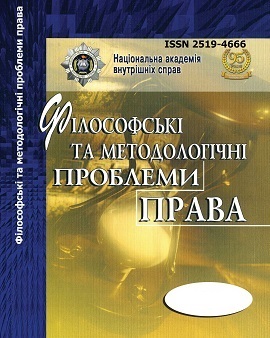Category of Purposes of Penalty in Creative Heritage of Representatives of German Classical Philosophy
Abstract
This paper explores the scientific positions regarding the purpose of punishment in the creative heritage of the representatives of the German classical philosophy. The article contains a philosophical analysis of pоenological issues in the history of the philosophy of law. It was emphasized that the philosophical discussion around the problem of the purpose of punishment did not go away for several centuries. The philosophical and legal concepts of punishment of the most prominent representatives of the German classical philosophy: I. Kant, G. W. F. Hegel, J. G. Fichte have been considered in detail.
The work aims to show that for modern philosophy of law it is important that the circle of the interests of these thinkers was very broad and turned out to be the classical framework of ontological and epistemological issues. These philosophers regarded man as the subject of knowledge within the limits of their own philosophical systems, they could not ignore the ethical side of being an individual and the political and social space of the development of reality, therefore their works seems interesting and relevant to the legal science even today, although since then it has passed more than two centuries.
The article states that by the teachings of the supporters of the relative theories the use of punishment is not explained at all simply by the fact that the crime is committed. The punishment is not applied because the crime was committed, but in order not to commit crimes. It is not an end in itself, but pursues well-known useful goals. In particular, it protects the society from the perpetrator, corrects the perpetrator and frightens those who could take an example from him etc. It is for this purpose that there is a punishment as a reasonable measure of counteraction to a crime.
The author believes that J. G. Fichte created a universal punishment system. He combines both (in a certain sense, by that time hostile with each other) key elements of the concept of achieving by punishment of useful purposes. In particular, in his opinion, the prevention of crimes and the correction of the perpetrators of a personʼs crime can be combined. Thus, the problem of the «cruelty» of some of the relative theories of punishment (the last believed that the main purpose of punishment is the intimidation of other persons, and a person is a means to achieve this goal, and, accordingly, the more severe the punishment, the greater is the preventive effect of the execution) was partially solved. In the article, the author concludes that Fichte thought: punishment is necessary and if it is used, it must contain (in addition to the purpose of intimidation of others, and another utilitarian purpose) correction of the convict himself. It is important that for this purpose corrections and prevention within the limits of one stable theory have not met.
Downloads
Abstract views: 144 PDF Downloads: 1339
Copyright (c) 2018 Philosophical and Methodological Problems of Law

This work is licensed under a Creative Commons Attribution-NonCommercial-NoDerivatives 4.0 International License.
- Authors reserve the right to authorship of their own work and transfer to the magazine the right of the first publication of this work under the terms of the Creative Commons Attribution License, which allows other persons to freely distribute published work with mandatory reference to authors of the original work and the first publication of an article in this magazine.
- Authors have the right to enter into separate additional agreements on non-exclusive dissemination of the work in the form in which it was published in the journal (for example, to post an article in the institution's repository or to publish as part of a monograph), provided that the link to the first publication of the work in this journal is maintained.
- The journal's policy allows and encourages the posting of articles by authors on the Internet (for example, in electronic storehouses of institutions or on personal websites), both before the submission of this manuscript to the editorial office and during its editorial processing, as this contributes to the creation of a productive scientific discussion and positively affects the efficiency and dynamics of citing the published work.




